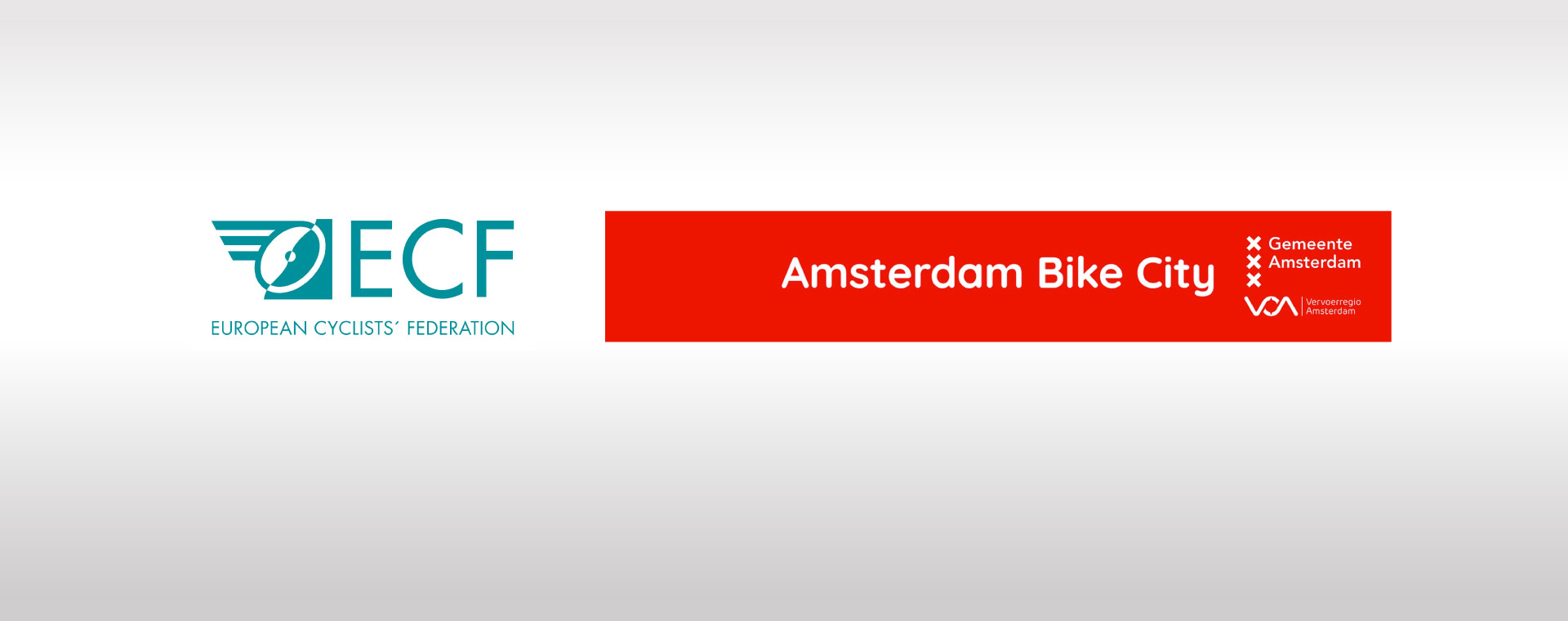Amsterdam Bike City goes Europe
Amsterdam Bike City has become a member of the ECF, the European Cyclists’ Federation. What does this club do? And why did ABC become a member? We asked Henk Swarttouw, chairman of the ECF and Anne Hovingh, policy advisor of the municipality of Amsterdam.
What is the ECF?
‘The short answer is that the ECF is a cooperation of European Cyclists’ Unions’, says chairman, former diplomat Henk Swarttouw. ‘But the ECF is much more than that. We are the organiser of Velo-city, the annual international cycling conference, we manage the long-distance cycle route project Euro Velo, and we have a number of networks, such as our Cities & Regions for Cyclists network. That is where Amsterdam Bike City will join.’
Why is ECF-membership of interest for Amsterdam?
Anne Hovingh: ‘In the field of cycling we collaborate quite a lot with other European cities. With Copenhagen, with Paris, they are all members of ECF. At a certain point it is illogical not to be a member. We want to be more present in Europe, to put cycling more on the map there. Then it makes sense to become a member of ECF. In Brussels, that is the club.’
Amsterdam is already a member of the Urban Mobility expert group in Brussels. They advise the European Commission on topics it is working on. One of the topics the commission wants advice on this year is the EU Cycling Declaration. In it, Europe recognises cycling as a force for achieving various European goals, including in the areas of the environment and health. Hovingh: ‘That is a very valuable position to be in. With ECF-membership, Amsterdam wants to be a bit closer to the action.’
The ECF is very happy with ABC in its ranks. Swarttouw: ‘We believe that Amsterdam owes it to its position. Of course, you can discuss whether Amsterdam is the best cycling city in the Netherlands, but that is how it is experienced abroad. Seen from abroad, Amsterdam is considered the best cycling city in Europe. We like having Amsterdam on board.’
The ECF is explicitly a platform for knowledge exchange as well: what can Amsterdam offer?
Hovingh: ‘We always get lots of questions about bicycle parking, even from cities like Copenhagen. That is quite unique. People find the OV-fiets very interesting and Amsterdam has a lot of OV-fietsen. We also get quite a lot of questions about the introduction of 30 km/h in the city. That is actually quite funny, because we are not a leader in Europe on that subject. Questions to Amsterdam are often about the link with bicycle infrastructure: about bicycle streets, for example. We are increasingly stating that the construction of separate bicycle paths is no longer the holy grail. It is about looking at what is appropriate in which street, about sharing space, and about speed and mass, and that actually falls within the larger question of how to design public space for bicycles.’
What kind of knowledge is Amsterdam interested in?
Hovingh: ‘I am curious to see how the electric bike, and especially the fat bike (fat tyre bike), is developing in other cities. The few last years we see that their numbers are growing strongly in Amsterdam. How is that going elsewhere? And we also have very specific topics. For example, how do other cities deal with parking of tricycles. Those are things we discuss with other Dutch cities as well.’
‘And I think we can learn a lot from other ECF members about how to stimulate cycling among certain groups. There are specific groups in Amsterdam who cycle less. For example men with a migration background. In Paris, they are working on that as well.’
Swarttouw adds: ‘There are even more topics that people abroad have more experience with. For example: how do you deal with electric scooters? Other countries have had 10 years of experience with that by now. In Amsterdam and the Netherlands scooters are not (yet) legal and not so present. Another topic: free floating share bikes (shared bikes without docking stations, ed.). I also see advantages for Amsterdam in a shared bike system. Most bicycles are parked most of the time, just like cars. And in many places there is a bike parking problem. Then you should actually share more. It is not that the Netherlands can do and know everything about cycling. The Netherlands know a lot, but not everything.’
What in Europe is relevant for Amsterdam traffic?
Europe regulates things that have an impact on Amsterdam traffic. Take fat bikes. If the Netherlands wants to regulate something for those in one way or another, you will soon have to deal with European regulations. Hovingh: ‘Yes, guidelines for electric bicycles are established in Brussels, our government has to go along with that. For us, it is useful to hear via the ECF how things are and what is possible.’
Swarttouw: ‘Amsterdam is also a bit of a laboratory; many things happen here two or three years earlier than elsewhere. Like now with the fat bikes, that will happen in the rest of Europe as well. Those are coming up in Belgium and Germany, but not yet as visible and massive as in Amsterdam. What does this mean for cycling? Is regulation possible? Our specialists are working on that.’
A great many things that are regulated at European level have an impact at the national level. And ultimately also on traffic in Amsterdam. The ECF is the lobby organization at the EU on behalf of cycling and related matters.
Swarttouw: ‘As an example, it has just been decided at European level that all new cars must have Intelligent Speed Adaptation (ISA). This allows to truly limit the speed of cars. That is a safety measure that also has an impact in Amsterdam. Or take the prevention of the import of those huge beasts of cars, those pick-ups. They are allowed through a loophole in the law, a goat path. These are also things we are concerned with. We are trying to fix that at the European level, because it has an impact on the safety of cyclists. But the car lobby is many times bigger and stronger than the bicycle lobby in Brussels. The ECF has 30 people in its office. That little in comparison to the number of people and the amount of money the car lobby has.’








